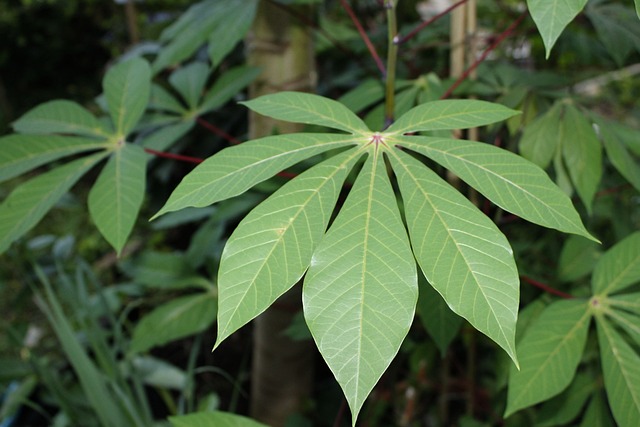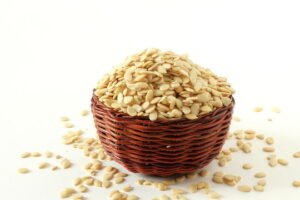Cassava also known as yuca is a tuber crop or starchy root vegetable that is eaten as food in many parts of Africa and Asia. Although its starchy roots are the most commonly consumed part, the leaves are also edible and beneficial to health.
Cassava leaves are incredibly rich in protein, dietary fiber, vitamins, minerals, and antioxidants. They are easily digested and help to prevent constipation. However, the leaves contain minimal amounts of cyanide and should be properly processed and cooked before eating.
Health benefits of cassava leaves
1. Highly nutritious
Cassava leaves are incredibly packed with minerals and vitamins. They are rich in iron, calcium, B vitamins, vitamin A, vitamin C, zinc, potassium, and magnesium. These nutrients help to maintain good health, repair body tissues, and build a strong immune system.
Research has found that the leaves contain more iron, protein, and zinc than their starchy root tubers [1].
2. Rich in protein
Cassava leaves are a great source of plant-based protein. Research has found that its protein content is comparable to the amount found in eggs [1][2].
100 g of cassava leaves will provide you with about 3.2g (32%) of protein – making it a great addition to vegan and vegetarian diets.
3. Rich in antioxidants
Cassava leaves are rich in antioxidants such as vitamin C, flavonoids, and carotenoids.
Antioxidants are substances that release free radicals to fight against diseases like cancer, diabetes, and heart disease, while carotenoids are the pigments responsible for their bright green color.
Research has found that its antioxidant content can explain its role in preventing certain types of cancers and metabolic diseases [2].
4. Improves digestion
Cassava leaves are packed with dietary fiber that helps promote good digestion and prevents constipation.
Adding cassava leaves to your diet can increase your dietary fiber intake – leading to efficient blood sugar control, reduced blood cholesterol levels, and overall improved gut health [2].
Also read: 15 Best African Foods High in Dietary Fiber
5. Promotes wound healing
Cassava leaves have anti-inflammatory properties that help promote wound healing and reduce swelling.
Studies have found that its content of flavonoids and other phytochemical agents may be responsible for its anti-inflammatory action – which explains its use in folk medicine to treat wounds and reduce swelling [3].
How to prepare cassava leaves for consumption
Cassava leaves are eaten as a vegetable in Indonesia, Nigeria, Ghana, Congo, and some other African countries. They are common additions to soups, stews, porridge, and other traditional dishes. Here are the popular cassava leaves recipes:
- Saka-saka (Cassava leaf soup): It is a popular dish in Central Africa. It is prepared by combining fresh ground cassava leaves with palm oil, onions, garlic, pepper, dry fish, ground peanuts, okra, and beef to make a delicious stew that can be eaten with fufu or rice.
- Gulai Daun Singkong: This dish is popular in Indonesia and other parts of Asia. It is a light, creamy curry cooked with coconut milk, spices, and cassava leaves.
- Salads: Some modern chefs have tried adding cassava leaves to salads as a healthy substitution for spinach.
How to remove toxins (poisons) from cassava leaves
Despite the many health benefits of cassava leaves, it is important to remember that they release cyanides, which may be poisonous if not processed and cooked properly.
The traditional method of removing toxins from the leaves includes:
- Washing the leaves thoroughly under running water to remove dust and dirt.
- Then, on low to medium heat, boil the leaves in water for about 10 – 15 minutes.
- Drain and wash them with clean water to remove any remaining toxins.
- Then finally add other ingredients into a pot with the leaves and cook till it is tender.
The bottom line
Cassava leaves are a nutritious addition to your daily diet. They are packed with vitamin C, calcium, iron, potassium, protein, and fiber. They also contain several antioxidants, which protect the body against disease-causing free radicals.
In addition, they are highly versatile and can be added to soups, stews, curries, and salads. The leaves are available all year round and are a great addition to a healthy, and sustainable eating plan.
However, remember to prepare and process your cassava leaves properly before eating to avoid ingesting toxins.
- Latif, S., & Müller, J. (2015). The potential of cassava leaf in human nutrition: A review. Trends in Food Science & Technology. Link
- Tsige, Temesgen Zekarias & Basa, Bakalo & Herago, Tamirat. (2019). Medicinal, Nutritional and Anti-Nutritional Properties of Cassava (Manihot esculenta): A Review.
- Boukhers, Imane et al. “Nutrition, Healthcare Benefits and Phytochemical Properties of Cassava (Manihot esculenta) Leaf Sourced from Three Countries (Reunion, Guinea, and Costa Rica).” Foods (Basel, Switzerland) vol. 11,14 2027. 8 Jul. 2022 10.3390/foods11142027
Get new free and exclusive health tips delivered straight to your inbox!



